[Dec 2007, Volume 4 Quarterly Issue] Pdf File size - The IIPM Think ...
[Dec 2007, Volume 4 Quarterly Issue] Pdf File size - The IIPM Think ...
[Dec 2007, Volume 4 Quarterly Issue] Pdf File size - The IIPM Think ...
You also want an ePaper? Increase the reach of your titles
YUMPU automatically turns print PDFs into web optimized ePapers that Google loves.
Anindo Banerjee,<br />
Head, Programme Initiatives, Praxis -<br />
Institute for Participatory Practices,<br />
Patna<br />
Accountable Governance And Pro-poor Markets<br />
For Effective Poverty Reduction<br />
"Adam Smith, the father of modern economics,<br />
is often cited as arguing for the “invisible hand”<br />
and free markets: fi rms, in the pursuit of profi ts,<br />
are led, as if by an invisible hand, to do what is<br />
best for the world. But unlike his followers, Adam<br />
Smith was aware of some of the limitations of<br />
free markets, and research since then has further<br />
clarifi ed why free markets, by themselves, often<br />
do not lead to what is best. As I put it in my<br />
new book, Making Globalization Work, the<br />
reason that the invisible hand often seems invisible<br />
is that it is often not there."<br />
ALTMAN Daniel, Managing Globalization.<br />
In: Q & A with Joseph E. Stiglitz,<br />
Columbia University and <strong>The</strong> International<br />
Herald Tribune (IHT),<br />
October 11, 2006<br />
In the month of October, when<br />
over twenty five thousand landless<br />
agricultural labourers hailing<br />
from various dalit 1 and tribal communities<br />
of India marched to New Delhi<br />
to press for their land rights and succeeded<br />
in securing a vital policy decision<br />
towards constitution of a highpowered<br />
‘National Land Reforms<br />
Council’ headed by the Prime Minister,<br />
they heralded a historic assertion<br />
against increasing market-led appropriation<br />
of vital resources like land,<br />
water, mines and forests. Given that<br />
the last two decades have witnessed<br />
countless instances of dispossession of<br />
the poor in developing economies<br />
from critical life-support systems,<br />
mostly at the behest of market-forces<br />
actively aided by agencies of the State,<br />
the issues concerning the role and obligations<br />
of market forces and agencies<br />
of the State towards poverty reduction<br />
need to be examined cautiously, with<br />
an eye on the impacts of contemporary<br />
trends and policies on the well-being<br />
of poor communities.<br />
Markets And <strong>The</strong> Poor<br />
<strong>The</strong> experiences of several African<br />
governments during the eighties and<br />
the nineties relating to policies aimed<br />
at overcoming acute fiscal imbalances<br />
are a good pointer to the potential impact<br />
of ungoverned market forces on<br />
critical sectors such as agriculture.<br />
Measures administered to this effect<br />
on the advice of international financial<br />
institutions like the World Bank included<br />
withdrawal of the public sector<br />
from sectors like agriculture, de-control<br />
of prices, reduction of farm subsidies<br />
and increased privatization. <strong>The</strong><br />
outcomes were equally radical: the<br />
drastic steps immediately affected<br />
over seventy percent of the poor in the<br />
region by drastically suppressing food<br />
production. A recently concluded evaluation<br />
2 of World Bank’s role in African<br />
agriculture attributed the crisis to the<br />
68 THE <strong>IIPM</strong> THINK TANK


![[Dec 2007, Volume 4 Quarterly Issue] Pdf File size - The IIPM Think ...](https://img.yumpu.com/29766298/67/500x640/dec-2007-volume-4-quarterly-issue-pdf-file-size-the-iipm-think-.jpg)
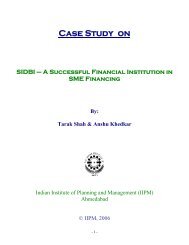
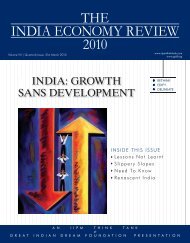
![[Feb 2008, Volume V Annual Issue] Pdf File size - The IIPM Think Tank](https://img.yumpu.com/43961117/1/190x245/feb-2008-volume-v-annual-issue-pdf-file-size-the-iipm-think-tank.jpg?quality=85)
![[June 2008, Volume V Quarterly Issue] Pdf File size - The IIPM Think ...](https://img.yumpu.com/41693247/1/190x245/june-2008-volume-v-quarterly-issue-pdf-file-size-the-iipm-think-.jpg?quality=85)
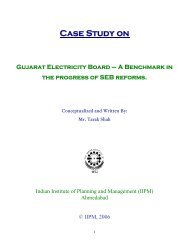
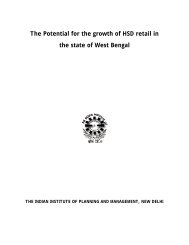
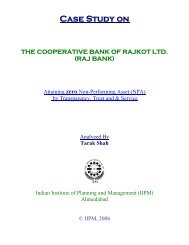

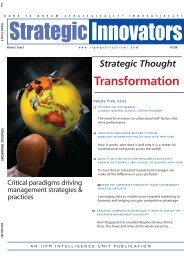
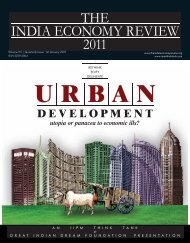
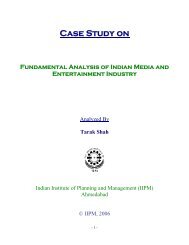
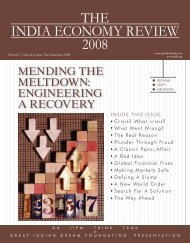
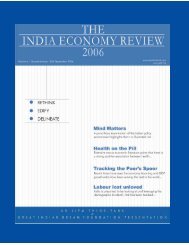
![[Volume VI | Quarterly Issue: 31st May 2009] Pdf File size](https://img.yumpu.com/27796051/1/190x245/volume-vi-quarterly-issue-31st-may-2009-pdf-file-size.jpg?quality=85)